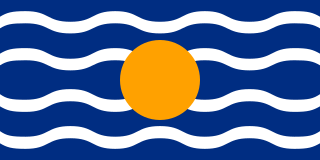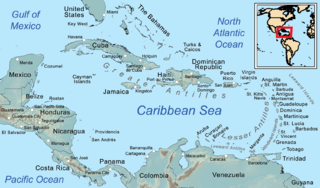
The Danish West Indies or Danish Antilles or Danish Virgin Islands were a Danish colony in the Caribbean, consisting of the islands of Saint Thomas with 32 square miles (83 km2); Saint John with 19 square miles (49 km2); and Saint Croix with 84 square miles (220 km2). The islands have belonged to the United States since they were purchased in 1917. Water Island was part of the Danish West Indies until 1905, when the Danish state sold it to the East Asiatic Company, a private shipping company.

The West Indies Federation, also known as the West Indies, the Federation of the West Indies or the West Indian Federation, was a short-lived political union that existed from 3 January 1958 to 31 May 1962. Various islands in the Caribbean that were part of the British Empire, including Trinidad and Tobago, Barbados, Jamaica, and those on the Leeward and Windward Islands, came together to form the Federation, with its capital in Port of Spain, Trinidad and Tobago. The expressed intention of the Federation was to create a political unit that would become independent from Britain as a single state — possibly similar to the Canadian Confederation, Australian Commonwealth, or Central African Federation. Before that could happen, the Federation collapsed due to internal political conflicts over how it would be governed or function viably. The formation of a West Indian Federation was encouraged by the United Kingdom, but also requested by West Indian nationalists.
A West Indian is a native or inhabitant of the West Indies. For more than 100 years the words West Indian specifically described natives of the West Indies, but by 1661 Europeans had begun to use it also to describe the descendants of European colonists who stayed in the West Indies. Some West Indian people reserve this term for citizens or natives of the British West Indies.

Sugar plantations in the Caribbean were a major part of the economy of the islands in the 18th, 19th, and 20th centuries. Most Caribbean islands were covered with sugar cane fields and mills for refining the crop. The main source of labor, until the abolition of chattel slavery, was enslaved Africans. After the abolition of slavery, indentured laborers from India, China, Portugal and other places were brought to the Caribbean to work in the sugar industry. These plantations produced 80 to 90 percent of the sugar consumed in Western Europe, later supplanted by European-grown sugar beet.

The University of the West Indies (UWI), originally University College of the West Indies, is a public university system established to serve the higher education needs of the residents of 18 English-speaking countries and territories in the Caribbean: Anguilla, Antigua and Barbuda, The Bahamas, Barbados, Belize, Bermuda, British Virgin Islands, Cayman Islands, Dominica, Grenada, Guyana, Jamaica, Montserrat, Saint Kitts and Nevis, Saint Lucia, Saint Vincent and the Grenadines, Trinidad and Tobago, and Turks and Caicos Islands. Each country is either a member of the Commonwealth of Nations or a British Overseas Territory. The aim of the university is to help "unlock the potential for economic and cultural growth" in the West Indies, thus allowing improved regional autonomy. The university was originally instituted as an independent external college of the University of London.

The Commonwealth Caribbean is the region of the Caribbean with English-speaking countries and territories, which once constituted the Caribbean portion of the British Empire and are now part of the Commonwealth of Nations. The term includes many independent island nations, British Overseas Territories and some mainland nations. It is also known as the English-speaking Caribbean,Anglophone Caribbean, Anglo-Caribbean, or English-speaking West Indies. The term is now used in preference over the older term British West Indies, which was used to describe the British colonies in the West Indies during decolonisation and following independence from the United Kingdom. Anglo-Caribbean and British Commonwealth Caribbean also became preferred replacement terms to British West Indies.

The West Indies is a subregion of North America, surrounded by the North Atlantic Ocean and the Caribbean Sea, which comprises 13 independent island countries and 18 dependencies in three archipelagos: the Greater Antilles, the Lesser Antilles, and the Lucayan Archipelago.

Erna Brodber is a Jamaican writer, sociologist and social activist. She is the sister of writer Velma Pollard.
Chinese Caribbeans are people of Han Chinese ethnic origin living in the Caribbean. There are small but significant populations of Chinese and their descendants in all countries of the Greater Antilles. They are all part of the large Chinese diaspora known as Overseas Chinese.

The Caribbean is a subregion of the Americas that consists of the Caribbean Sea and its islands, the nearby coastal areas on the mainland may also be included. The region is southeast of the Gulf of Mexico and the North American mainland, east of Central America, and north of South America.
The Caribbean Philosophical Association (CPA) is a philosophical organization founded in 2002 at the Center for Caribbean Thought at the University of the West Indies, in Mona, Jamaica. The founding members were George Belle, B. Anthony Bogues, Patrick Goodin, Lewis Gordon, Clevis Headley, Paget Henry, Nelson Maldonado-Torres, Charles Mills, and Supriya Nair. The association promotes the view that philosophy is the "rigorous theoretical reflection about fundamental problems faced by humanity", and that Caribbean philosophy in particular should be seen as "a transdisciplinary form of interrogation informed by scholarly knowledges as well as by practices and artistic expressions that elucidate fundamental questions that emerge in contexts of 'discovery,' conquest, racial, gender, and sexual domination, genocide, dependency, and exploitation as well as freedom, emancipation, and decolonization."

Sir Hilary McDonald Beckles KA is a Barbadian historian. He is the current vice-chancellor of the University of the West Indies (UWI) and chairman of the CARICOM Reparations Commission.

Violet Eudine Barriteau,FB, GCM, is a professor of gender and public policy, as well as Principal of the University of the West Indies at Cave Hill. She was also the president of the International Association for Feminist Economics (IAFFE) from 2009 to 2010, and she is on the advisory editorial boards of Palimpsest: A Journal on Women, Gender, and the Black International, published by SUNY Press, and Signs: Journal of Women in Culture and Society, published by University of Chicago Press.
Verene Albertha Shepherd is a Jamaican academic who is a professor of social history at the University of the West Indies in Mona. She is the director of the university's Institute for Gender and Development Studies, and specialises in Jamaican social history and diaspora studies. She has published prolifically in journals and books on topics including Jamaican economic history during slavery, the Indian experience in Jamaica, migration and diasporas and Caribbean women's history, and is a contributor to the 2019 anthology New Daughters of Africa.

University of the West Indies at Cave Hill is a public research university in Cave Hill, Barbados. It is one of five general campuses in the University of the West Indies system.
Caribbean Quarterly is a quarterly peer-reviewed academic journal covering studies on the culture of the Caribbean, with its content comprising scholarly articles, essays, criticism, creative writing and book reviews. The journal is published for the University of the West Indies by Taylor & Francis. One of the oldest periodicals in the English-speaking Caribbean, it was established in 1949. The editor of Caribbean Quarterly is Kim Robinson-Walcott. There is an associated monograph series.
Dr. Kishore Shallow is a cricket administrator from St. Vincent and the Grenadines. He is currently the President of Cricket West Indies, Former President of Windward Islands Cricket Board of Control, and Former President of St. Vincent and the Grenadines Cricket Association. Dr. Shallow is also a director on the International Cricket Council, the world governing body for cricket.
Linnette Vassell is a Jamaican academic, writer, and feminist, who advocates for gender equity and community management of water resources.











